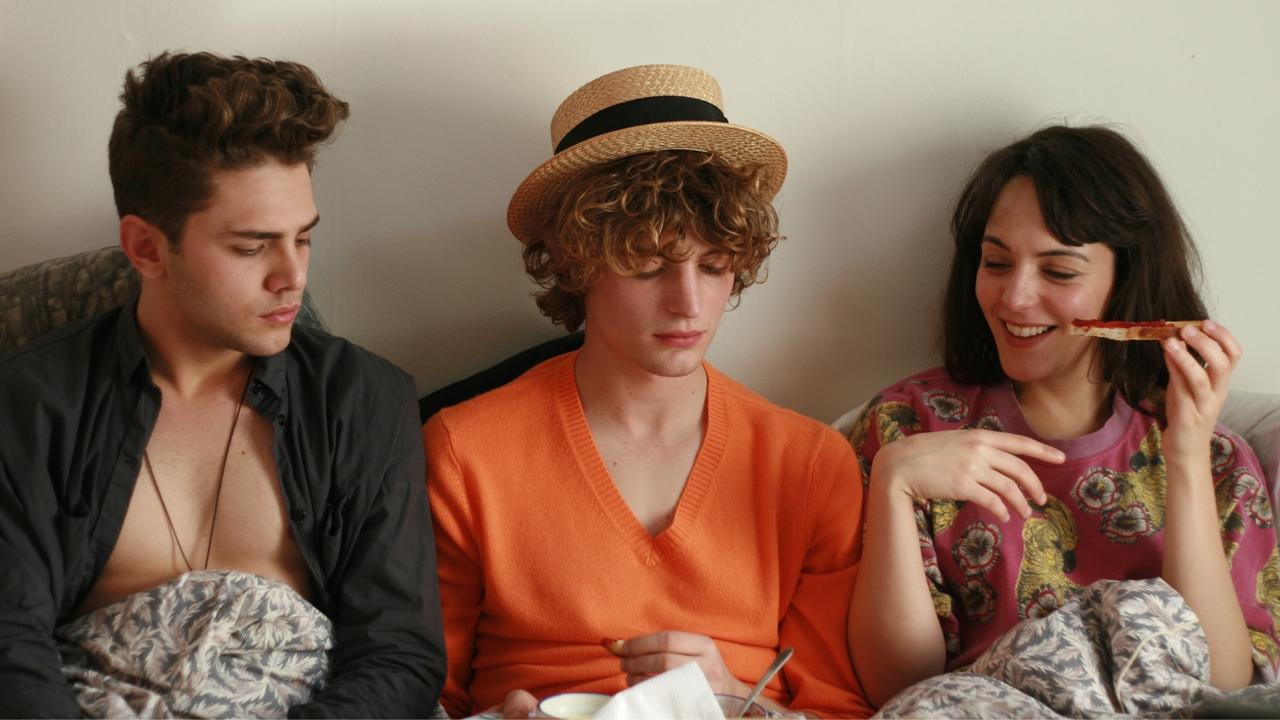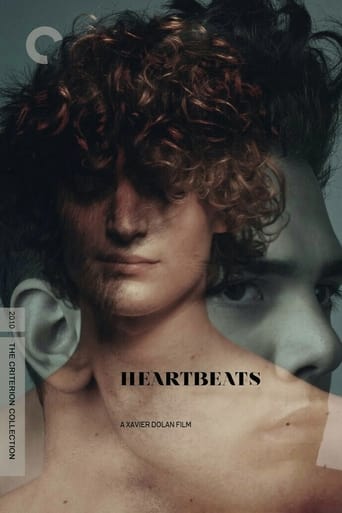paul2001sw-1
'Heartbeats' is a fun little film, a sort of Gallic rom-com, although don't expect the obligatory happy-ending where the two protagonists rejected in love hook up with each other. A simple story of unrequited love and ordinary obsessiveness, the film cuts to the chase in spite of its good looking characters and chic vibe: we're not all equally attractive, and we don't love another in equal amounts. The rejecter in this story doesn't even do anything particularly wrong, except treat others with a combination of openness and carelessness that is surely only natural when blessed with a certain type of good looks. The film's resolution of his hitherto ambiguous sexuality is clever, and the film as a whole is brilliantly orchestrated with a collection of popular songs, from different eras, each of which nonetheless is particularly chosen to fit a certain mood and to complement the images on screen at that time. Oddly, in spite of the emotional pain its characters are in, this film is a stylised paean to being young, beautiful and in love: the fact that it hurts only makes it sweeter.
Arcadio Bolanos
Having a threesome often means dealing with very difficult personal issues. If you don't succeed, then this strange relationship is doomed to fail. When Francis and Marie meet Nicolas, a young, blonde, rich and highly intelligent boy, their lives change. Although at first they try to deny it, they fall deeply in love with Nicolas.Nothing can guarantee a healthy relationship, but here the protagonists embark upon an almost impossible journey. Nicolas acts like an unprejudiced and very liberal young man who doesn't care about Francis' homosexuality or Marie's uptightness. As they become friends, Nicolas transforms himself into the object of desire of both Francis and Marie.Nonetheless, nothing seems to indicate that Nicolas has feelings towards Francis, after all they have only shared a handful of meaningless –although rather intimate- moments: Nicolas had been roughhousing with Francis in the woods, and also, after sleeping together, Francis had noticed Nicolas' leg rubbing against his own. These are just minuscule details but Francis starts to get obsessed about his young friend. At the same time, Marie convinces herself that Nicolas is the love of her life; she is now worried about Francis advances, and because of that their friendship might come to an end.Nicolas is very handsome and exudes a sex appeal unlike any other youngster, and it's because of that that he turns into a symbolic phallus, ascribing to the genitality that condenses the nature of the object of desire. To explain this situation better, let's remember that Marie keeps dating other men but she finds these dates dull and completely forgettable. Francis does the same, but as he has casual sex with other guys, he realizes that none of them can be compared to Nicolas. Erotic objects, for man, are frequently aberrant, multiple and interchangeable. This is why Francis can still have sexual intercourse with multiple partners, who have no real defining features, they are, after all, interchangeable and, ultimately, aberrant. Under these circumstances, Francis' pain and suffering can only be subsidized by the tacit competition he maintains with his friend Marie. Jacques Lacan said once that no object of need and/or demand will ever satisfy the desire/subject. This is why Nicolas inserts himself in the realm of the phantasm; id est, he's an idealized figure that can never defy reality nor exist in the real.The more time Francis and Marie spend with Nicolas, the more elusive and ungraspable he becomes. As they get closer to him, a barrier, a distance, is made evident. When the objects of need are metabolized ('eroticized') into signifiers of desire by virtue of the demand, it's rather obvious that any object will do as "object" of desire, since none will do. When Francis is alone in Nicolas's bedroom and starts smelling his pants and shirts, he cannot stop masturbating, evoking not the real boy but his traits, his invisible presence that has no place in the realm of the real. Nicolas, after all, is the object a, the object of desire, and since he is the target of men and women's libido he's also, in general terms, a nonexistent character.This doesn't mean, however, that Nicolas' presence or absence doesn't have a profound effect in the lives of Francis and Marie. Director Xavier Dolan creates a fascinating group of characters and a really complex, intense and innovative story. Xavier Dolan is not only a magnificent writer and filmmaker, he's also a wonderful actor (he plays Francis, although he also had a part in another gay-themed production: Miroirs d'été, which I reviewed a few months ago). Niels Schneider gives an astounding performance as Nicolas, and so does Monia Chokri. Not only is the acting great, but the cinematography in general and the soundtrack of this film are truly unforgettable. In the end, as Lacan explains to us, the object of desire is bound to impossibility… and that's what the protagonists learn the hard way. Poignant, sad and powerful, Dolan's film is a masterwork.
bandw
Francis (a gay man) is friends with Marie (a straight woman). When they meet Nicolas, a young Adonis, they both fall for him and a competition ensues for his affections. We are clear where Francis and Marie stand in this threesome, but what Nicolas is up to remains a mystery. There are hints that he may be gay, like the time he comments to a young man at a party, "Did it hurt too much when you fell from heaven?" Nicolas had to be aware of the intensity of the feelings he was arousing in his friends, but his desire was apparently to keep them on the hook to feed his own ego. We get evidence of the game he was playing when the jealousy between Francis and Marie over Nicolas erupted into a physical fight and he only stood back and smirked.As this movie went along I kept thinking, "There isn't much here." But when it was over I came to feel the the whole was greater than the sum of its parts. The intensity and pain of unrequited young love is captured, sometimes with a disappointed look, sometimes with a scream of pain, sometimes with graphic detail as when Francis puts one of Nicolas' shirts over his head and masturbates. Finally both Francis and Marie force the issue. In one of the most painful scenes Francis confesses to Nicolas that he wants to kiss him, only to be met with the response, "How could you ever think I was gay?" Well, Nicolas was not making it all that clear that he wasn't. Marie's confession of love was also rebuffed. A humorous and insightful final scene has you thinking that the whole scenario is about to start all over again.It's the style of the film that will engage you or put you off. There are a lot of slow motion shots that seem to have little relevance to the story, like a long take of Francis walking down the street. In conjunction with dramatic use of color and some heavy-hitting music, the pacing of the slow motion shots helps create a dreamlike mood, and that is the appropriate mood for the story, since the three main characters are in a dreamlike state--how easy it is to project our needs and fantasies onto a likely candidate and ignore the taking of any hard data. I could have done with fewer slow motion shots of cigarette smoking. I suppose those were inserted in homage to "Breathless," but they don't play too well fifty years on. There are a number of other retro touches in evidence, from Marie's dresses to Francis' pompadour.When I found out that the guy who played Francis (Xavier Dolan) was the writer and director and was only 21 years old at the time I could only think, "The kid's got style." This movie has a single theme that is handled well. I look forward to seeing films where Dolan applies his talents to more complex material.

